People worldwide are attracted to pet parrots because they are long-lived, intelligent, and interactive. This bird is stunningly attractive and has an astounding mental capacity.
It can become alarming to a parrot owner when a normally good-natured parrot suddenly begins to bite.
A biting parrot could be because the parrot is stressed or annoyed. Parrots may also bite if they are hungry, thirsty, or sleepy.
Certain seasons, like the breeding season, can make parrots more aggressive and more prone to biting.
It is important to recognize the underlying reason for your parrot’s sudden biting, so you can rectify the situation.
While some issues are easily remedied, such as hunger or thirst, ongoing stress can be more difficult to solve.
Remember never to show a big reaction to your parrot’s bite, but instead, stay calm and consistent. A parrot left alone in time out for a few moments will quickly learn biting does not earn more attention.
Could My Parrot Be Tired?
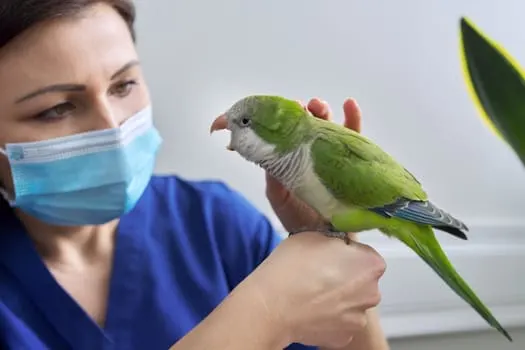 A parrot needs about 12 hours of sleep every night to stay healthy. If your parrot isn’t getting enough sleep, there’s a good chance it could wake up grumpy.
A parrot needs about 12 hours of sleep every night to stay healthy. If your parrot isn’t getting enough sleep, there’s a good chance it could wake up grumpy.
If you notice your parrot suddenly starts to bite, it could be getting restless sleep, leading to aggression and irritation.
Ensure your parrot is in a quiet part of the house and has an uninterrupted sleep. Ensure there aren’t any loud noises or distracting sounds that could wake your parrot.
If you notice your parrot is starting to bite toward the evening, start your parrot’s bedtime routine sooner.
Your parrot may simply need an adjusted bedtime routine to help it get enough sleep every night.
Is My Parrot Hungry?
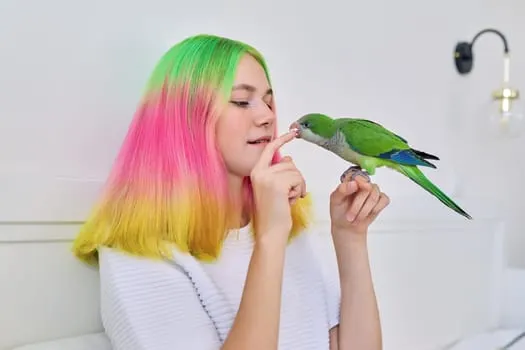 Keeping your bird on your shoulder throughout the day is a fun way to interact with your parrot and build a strong relationship.
Keeping your bird on your shoulder throughout the day is a fun way to interact with your parrot and build a strong relationship.
Often, even after a long day of great socialization, parrot owners are shocked to feel their parrot bend down and give them a strong bite.
While your parrot probably isn’t angry with you, it is most likely trying to tell you something. A parrot that has been out of the cage and away from food and water might be hungry or thirsty.
If this happens, remain calm and do not immediately reward your parrot with food. This action will only reinforce bad behavior.
Instead, recognize what your parrot wants and return your parrot to its food and water inside its cage after a few minutes have passed.
It is also a good practice to recognize when your parrot has been away from food and water too long and return your parrot to the cage before a bite occurs.
How Can Diet Impact My Parrot?
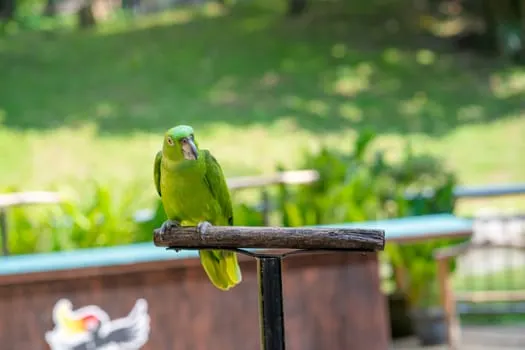 All too often, an imbalanced diet is to blame for sudden behavior changes or problems. A parrot that is not receiving the right vitamins and minerals can become irritable, lack energy, and feel unwell.
All too often, an imbalanced diet is to blame for sudden behavior changes or problems. A parrot that is not receiving the right vitamins and minerals can become irritable, lack energy, and feel unwell.
When a parrot is not feeling well, it could become more aggressive and prone to biting.
It is a good practice to move your parrot away from commercially bought seeds gradually and pushed toward a diet that includes fresh and nutritious grains, veggies, pasta, and fruit.
Parrots are happy to eat a well-balanced “chop” diet that combines these fresh ingredients. Treats, like sunflower seeds, are still acceptable, but try to limit the number of treats each day.
Sunflower seeds are excellent to use as a training reward but should not be the main staple in your parrot’s diet.
Could My Parrot Be Sick?
It is important not to rule out injury or illness as a leading cause of your parrot biting. Your parrot may be uncomfortable or trying to tell you it isn’t feeling well.
Handling even a friendly bird that is hurt could cause more pain and irritation. If you suspect that your bird is hurt or unwell, be sure to visit the vet for a wellness exam.
How Does Age Impact Biting?
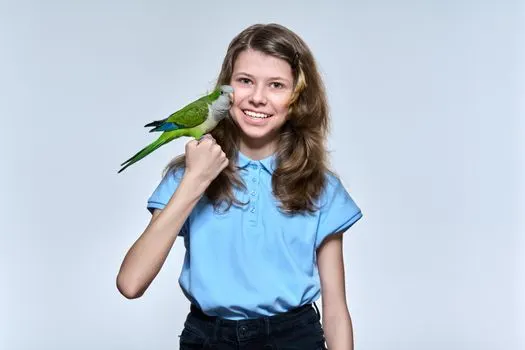 One of the biggest causes for a biting parrot could be the bird’s age. When the bird reaches sexual maturity, the bird can become unpredictable.
One of the biggest causes for a biting parrot could be the bird’s age. When the bird reaches sexual maturity, the bird can become unpredictable.
This behavior is especially true with male parrots, although biting certainly can occur in female parrots as well.
During sexual maturity, your bird may form a close attachment to one particular person and be aggressive toward another.
A big part of this emotional swing and biting could be hormonal changes and the season. During the breeding season, your parrot’s hormones are in overdrive, which could make it more aggressive than usual.
Your bird can easily become overstimulated, which can translate to aggressive behavior. It is important to understand when these seasons are coming and give your bird a little extra space and time to avoid biting.
Could My Parrot Be Stressed?
Sometimes, stress can cause your parrot to bite. If your parrot does not like its environment or is annoyed with you, it will let you know by biting.
To determine if your parrot is stressed, it is important to pay attention to patterns. Observe the time and situation when bites occur.
A parrot biting when you get home from work could be letting you know it is lonely and annoying that you left.
What Are Some Physical Signs of Stress in a Parrot?
Detecting stress in a parrot will help improve your life and relationship with your parrot and help keep your parrot healthy.
Prolonged stress over a long period can adversely impact your parrot’s overall health and wellbeing.
Be sure to watch out for physical signs of stress like biting, also other signs including:
- Screaming or Shrieking
- Decreased Vocalization
- Decreased Appetite
- Self Mutilation or Feather Picking
How Can I Stop My Parrot From Biting?
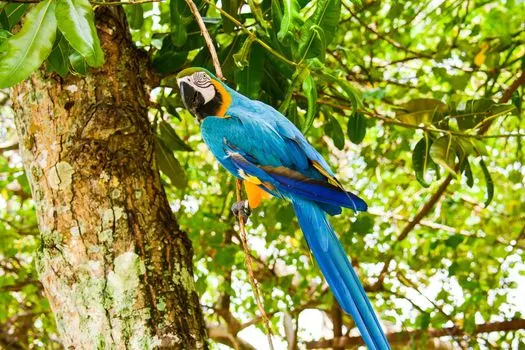 Struggling with a biting parrot can be stressful and frustrating for both you and your bird. Luckily, there are some safe and easy tactics and methods to stop your parrot from biting.
Struggling with a biting parrot can be stressful and frustrating for both you and your bird. Luckily, there are some safe and easy tactics and methods to stop your parrot from biting.
Some of the best ways to stop your parrot from biting include:
- Stay Calm – Often, your parrot is biting you to get a reaction. The key is to remain calm, even if the bite hurts. Never yell or scold your parrot, which could only frighten and entice your parrot to bite more. If your parrot bites, push into the bite until it lets go. Then issue a stern “NO!” for your bird. After your warning, leave the parrot alone for about 20 minutes. Usually, the scolding combined with isolation is enough to teach your parrot that biting is not worth it.
- Consistency – When scolding your parrot for biting, it is important to remain consistent. When your parrot understands it will be scolded and left alone for biting, it will be less likely to continue biting. Every family member must be on board with the same corrective actions to remain consistent.
- Understand the Cause – It is important to understand what is causing your parrot to bite in the first place. If something is upsetting your parrot or your parrot is feeling ill, correcting the underlying cause is an easy way to stop the biting.
- Body Language – A parrot will rarely bite without giving a proper warning. Pay close attention to your parrot’s body language, so you know when a bite is incoming. Usually, a frightened bird and about to bite will flatten its features and open its eyes widely. An angry bird will make warning sounds like a hiss or a growl. When you understand a bite is coming, you can better remove your bird from the stressful situation that triggers a biting reflex.
Are Male Parrots More Prone to Biting?
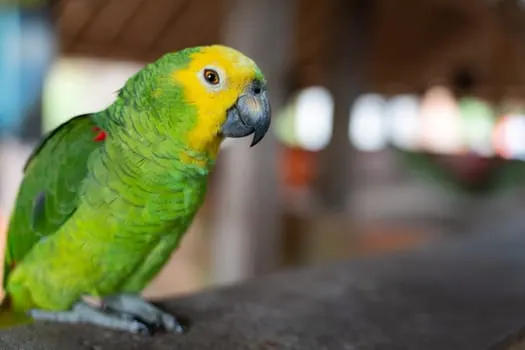 If you struggle with a biting parrot, it may be connected to your parrot’s sex. Male parrots, in general, are more aggressive than females.
If you struggle with a biting parrot, it may be connected to your parrot’s sex. Male parrots, in general, are more aggressive than females.
It follows then that males are more likely to bite than females. Of course, there are instances where males can be completely sweet, and females can bite.
Most male aggression will occur when the male goes through hormonal changes, which happen during the breeding season.
Males will become more mellow as adults and will often be the least aggressive as they reach their senior years.
Related Questions
Can two male parrots live together?
Housing multiple parrots together is possible, and you can house up to two parrots in the same cage. However, it is not a good practice to house two male parrots or two female parrots together.
Before putting two parrots together, ensure they are the same species and the opposite sex. Parrots of the same sex will often fight for dominance.
Do parrots have a favorite person?
Unlike other pet birds that are social and love every family member, parrots tend to gravitate toward one person in the family.
These so-called “one-person birds” will favor a single person, often getting extremely excited when the chosen person approaches the cage.
Some parrots will go so far as to ignore or shun other people in the house, and some may even become aggressive to anyone that isn’t their favorite person.
Related Guides
Our team is composed of pet care professionals, veterinarians, and pet owners. To date, we’ve conducted thousands of hours of research to publish the most accurate pet information.
Most of the writers on our site are vets with 10+ years of clinical experience, ranging from small practice, to equine practice, academia, and surgery. Our goal is to help every pet owner get the information they seek about their dear companions.

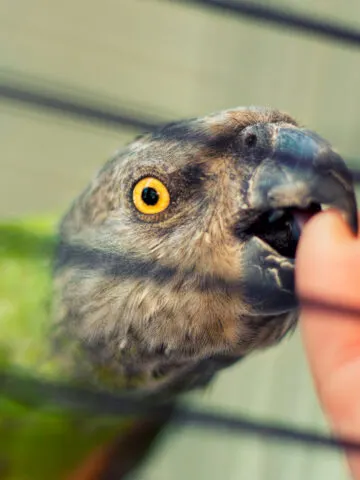

Leave a comment
You must be logged in to post a comment.